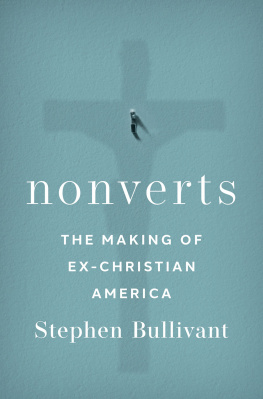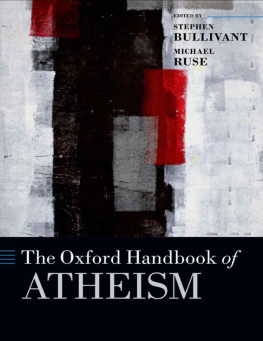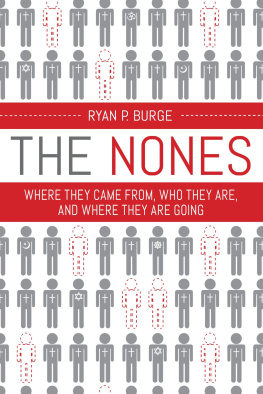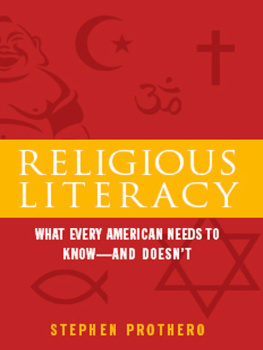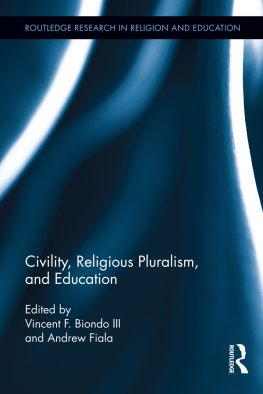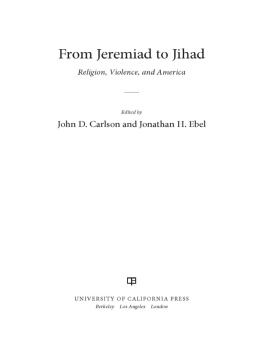NONVERTS

Oxford University Press is a department of the University of Oxford. It furthers the Universitys objective of excellence in research, scholarship, and education by publishing worldwide. Oxford is a registered trade mark of Oxford University Press in the UK and certain other countries.
Published in the United States of America by Oxford University Press
198 Madison Avenue, New York, NY 10016, United States of America.
Stephen Bullivant 2022
All rights reserved. No part of this publication may be reproduced, stored in a retrieval system, or transmitted, in any form or by any means, without the prior permission in writing of Oxford University Press, or as expressly permitted by law, by license, or under terms agreed with the appropriate reproduction rights organization. Inquiries concerning reproduction outside the scope of the above should be sent to the Rights Department, Oxford University Press, at the address above.
You must not circulate this work in any other form and you must impose this same condition on any acquirer.
Library of Congress Control Number: 2022021552
ISBN 978-0-19-758744-7
eISBN 978-0-19-758746-1
DOI: 10.1093/oso/9780197587447.001.0001
Contents
Thanks are due, above all, to the seventy or so nonverts who generously gave up their time and, in several cases, prudent inhibitions about meeting up with strangers in bars to contribute to this project. A great many of them, suitably pseudonymized, end up quoted in these pagessome at great lengthand I hope they enjoy finding themselves herein. I hope too that they feel like they have been represented in a fair and sympathetic manner. Naturally, not everyone ended up being mentioned or quoted directly. But all, without exception, were crucial for informing my ideas, and contributed much to the conclusions I draw (for which I alone, naturally, am responsible). I shall remain ever grateful for their kindness and candor alike.
As well as meeting around fifty of Nonverts participants myself, I also had the assistance of two excellent researchers: Dr. Jacqui Frost and the late Dr. Tommy Coleman, who conducted interviews for me in Minnesota and Tennessee, respectively. News of Tommys untimely death reached me in December 2021, as I was in the midst of making the final edits to this manuscript. This book is dedicated to him.
Many others contributed to this project in all kinds of ways. The work was made possible by the generosity of the John Templeton Foundation, which funded the research as part of the Understanding Unbelief project (grant no. 6024), led by my long-time nonreligion colleagues, collaborators, and compadres Drs. Lois Lee, Jon Lanman, and Miguel Farias (plus me).
My agent, Alice Martell at the Martell Agency, and editor, Theo Calderara at Oxford University Press, have been enthusiastic supporters of the book, not least in their encouraging swiftness in signing up me (Alice) and it (Theo). I hope they end up feeling that the gamble paid off.
A great many others, from all the many areas of my personal and professional life, deserve mention here too, including Claire Berlyn, Zofia Kicinova, Dr. Aprilfaye Manalang, Dr. Josh Bullock, Dr. David Bullivant, Norma Bullivant, Deacon Tom Gornick, Mary-Jo Gornick, Rod Dreher, Fr. Hugh Somerville-Knapman, Dr. Ryan Cragun, Brandon Vogt, Lizzie Ruse, Roz Mackraz Dieterich, Rev. Dr. David Poecking, Jordan Summers Young, Dr. Luke Arredondo, Elena Arredondo, Rev. Dr. Ryan Burge, Bernadette Durcan, Tim Kinnear, Dr. Jacob Phillips, the staff and regulars of The Penny Black, and Andrew Tucker.
The bulk of this book was written during the Covid-19 pandemic. I am indebted to Charles Tanqueray and James Beam for providing unfailing sources of comfort and resilience. My wife, Dr. Joanna Bullivant, has been characteristically wonderful throughout, triumphing over all the additional trials weve experienced over the past few years as she always does. Our four children, ever mindful of the need to maintain a proper work-life balance, have nobly kept us both from working for too long at any one time. Daddy loves them very much indeed.
Please note that where I have quoted directly from my interviewees, I have occasionally tidied the transcripts for ease of reading. I have kept these changes to a minimum, however, and have been careful to preserve both original meaning and personal, idiomatic style.
Where possible, I have given page references for works cited. However, in several cases, I read the books on Kindle or listened to them as audiobooks. In these cases, rather than give generally unhelpful references to location or timestamps, I have simply indicated the chapter instead.
All web links given in the endnotes were correct as of October 2021.
You British?
Yeah. I live near London, I reply, handing over my passport.
Youre the third Brit weve had in today.
Were preparing for Brexit, I joke. He nods thoughtfully, with solemn affirmation.
Yallll need it.
It, in this case, isnt political wisdom, or prayer, or a stockpile of food or medicine (though, in the event, all three would have been prescient advice). The it I am apparently in need of today is firearms training.
I dont know whether southern Louisiana is renowned for its gun ranges, but I can honestly say Ive never been to a nicer one. The people are warm and welcoming. Safety and responsibility are emphasized at all times. Even the T-shirts emblazoned with LOVE spelled out with weaponrythe O is a grenade; the E looks, to my as-yet-untrained eye, like an upended Kalashnikovare neatly arranged and reasonably priced.
Im here as the guest of John, a professional in his early thirties and an ambassadorial firearms enthusiast: always interested to expose people with no experience with guns to the gun culture, especially if they are from another country. We meet at a coffee shop on the other side of town before driving over in our own vehicles. I got lost in traffic on the way, but I know Im in the right place when I spy Johns Taxation is Theft bumper sticker in the parking lot. John, evidently a regular, is inside chatting with the staff. With him are the guns he has carefully chosen for my afternoons education: two pistols and an AR-15 semiautomatic.
John is the second new person Ive met in town, and I like him a lot. Hes earnest and erudite, laying great store by evidence, facts, and rational argument: pro-science, albeit not to the extent of venerating its findings uncritically, and getting a giant science bonerall his phrasesabout it. Our conversation flows freely: from the ideas of Epicurus to the sex lives of octopuses, right through to the future of climate change, the societal implications of artificial intelligence, and what transferable skills a modern time-traveler might have in the ancient Roman job market. (Because we know that germs are a thing and that if you boil all your instruments and wash stuff... So that would be John in ancient Rome: just a weird doctor who had a funny accent from the future.) Since he tells me hes the kind of person who thinks before he speaks, these are clearly the kinds of things hes thought a great deal about.
Compared to his real pet topics, though, these are merely the byproducts of wide reading and idle musing. What really interests John are politics, guns, and, well, the politics of guns. I used to be a Republican, he later tells me over email, when I thought I knew more than I did. An enthusiastic Bush voter in 2004, he only grudgingly supported McCain four years later because I was so concerned about Obama. Those fears softened over time when Obama didnt do all the extreme far-left stuff that I had allowed Republican talking points to scare me about. Lesson learned, John bought his AR-15 just before the 2016 election, as I was sure that Hillary would win, talk about gun control, and cause another Obama-era panic-buying situation and drive prices up. The Trump years, though a total shit-show, at least provided a much needed shake-up. Ultimately, though, John perceives little difference between red and blue: The status quo on so many things remains the same regardless of who is in power. You get unchecked spending, huge deficits, and constant warfare. You just get it with or without abortions. Hes voted Libertarian since 2012.

